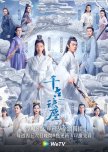Questa recensione può contenere spoiler
Who can the gods pray to when in difficulty?
Visually, Ancient Love Poetry was the most stunning Chinese drama I've seen so far. Philosophically, it was the weakest. Regardless, it was quite intriguing and awe-inspiring at times.
Ancient Love Poetry is an epic that traverses the time from the beginning of the gods to their later fallen state of weakened reincarnation, all the way to the restoration of their status as top gods. The male lead, named BaiJue, is a top God in the highest heaven, tasked with training ShangGu, the destined-to-be top goddess of chaos. BaiJue was raised by the strict and harsh “Ancestral God” who was like a Heavenly Father of the divine realm before he disappeared into chaos. Consequently, BaiJue embodies the temperament of a strict disciplinarian who always sacrifices the pleasures of the present in order to maximize the greater good for the future of all creatures. ShangGu embodies the exact opposite temperament of BaiJue in how she is always living in the moment, developing relationships with friends, and having fun. She is like a big ray of sunshine that warms BaiJue’s frozen heart. For the first time, he learns how to enjoy the moment. As opposites attract, BaiJue realizes that he needs ShangGu’s influence in his life and falls madly in love. Little does he know, per the laws of the universe, every god or goddess of chaos is destined to be required to sacrifice their life to delay the catastrophe of cataclysmic entropic chaos that is constantly trying to consume all of existence. By training ShangGu to develop her mastery of chaos, he is further sealing her fate. By the time the waves of chaos begin crashing in on the divine realm and eating up their kingdom, ShangGu learns of the revelatory voice of the Ancestral God who tells them that the only way to end the rampage of chaos is if a god or goddess of chaos sacrifices themselves to it. BaiJue realizes that his love for ShangGu has flipped his philosophy upside-down. He is no longer willing to prioritize the wellbeing of all creatures. He now wants to prioritize the wellbeing of ShangGu. But it is too late. ShangGu has matured into her role as top goddess and is unwilling to let everything die because of her selfishness.
As the story goes on, the two of them reincarnate in weaker-tier divine forms, but still try to use their powers to help the weak mortals who suffer greatly at the byproducts of the actions of the gods. When the gods war against the demons, comets fall from the sky and cause great suffering and destruction among the mortals. ShangGu takes great interest in protecting them, and they promise to pray to her and worship her in return for her help. But eventually the powers of natural entropic chaos are rekindled and all sorts of natural disasters begin occurring around the universe. ShangGu tries her best to use her powers to calm down the storms so that less people will suffer, but she realizes that even occupying the status of a goddess, she still feels helpless. At this point of discouragement she says, “When mortals encounter difficulties, they will pray to the gods, but what is to be done when gods meet difficulties?” This theological paradigm highlights the lack of omnipotence in the Chinese pantheon of gods. When the gods are no longer all powerful, the philosophic problem of evil is instantly dissolves. We don’t suffer because the gods lack the compassion to help us, we suffer because natural chaos is even more powerful than the gods. This allows us as mortals to empathize with the gods and even root for them in the great cosmic battle between good and evil, order and chaos, yin and yang.
Some disappointing aspects of the philosophies within Ancient Love Poetry are a support for “ends justify the means” theft, murderous revenge for the mistake of unintended collateral damage manslaughter, and child abandonment while grieving for the loss of loved ones. These philosophic errors seem to display a pre-Kantian level of philosophic maturity. Immanuel Kant helped reveal the wisdom in deontology for negating “ends justify the means” conclusions. Kant also revealed the wisdom in nuancing out the intentions behind crimes so that intentional murder can be punished more severely than unintentional manslaughter. Kantian emphasis on morality as “duty” also helps show the immorality of abandoning one’s duty to care for one’s children.
More reviews: https://transcendentphilos.wixsite.com/website/post/the-philosophy-of-chinese-dramas
Ancient Love Poetry is an epic that traverses the time from the beginning of the gods to their later fallen state of weakened reincarnation, all the way to the restoration of their status as top gods. The male lead, named BaiJue, is a top God in the highest heaven, tasked with training ShangGu, the destined-to-be top goddess of chaos. BaiJue was raised by the strict and harsh “Ancestral God” who was like a Heavenly Father of the divine realm before he disappeared into chaos. Consequently, BaiJue embodies the temperament of a strict disciplinarian who always sacrifices the pleasures of the present in order to maximize the greater good for the future of all creatures. ShangGu embodies the exact opposite temperament of BaiJue in how she is always living in the moment, developing relationships with friends, and having fun. She is like a big ray of sunshine that warms BaiJue’s frozen heart. For the first time, he learns how to enjoy the moment. As opposites attract, BaiJue realizes that he needs ShangGu’s influence in his life and falls madly in love. Little does he know, per the laws of the universe, every god or goddess of chaos is destined to be required to sacrifice their life to delay the catastrophe of cataclysmic entropic chaos that is constantly trying to consume all of existence. By training ShangGu to develop her mastery of chaos, he is further sealing her fate. By the time the waves of chaos begin crashing in on the divine realm and eating up their kingdom, ShangGu learns of the revelatory voice of the Ancestral God who tells them that the only way to end the rampage of chaos is if a god or goddess of chaos sacrifices themselves to it. BaiJue realizes that his love for ShangGu has flipped his philosophy upside-down. He is no longer willing to prioritize the wellbeing of all creatures. He now wants to prioritize the wellbeing of ShangGu. But it is too late. ShangGu has matured into her role as top goddess and is unwilling to let everything die because of her selfishness.
As the story goes on, the two of them reincarnate in weaker-tier divine forms, but still try to use their powers to help the weak mortals who suffer greatly at the byproducts of the actions of the gods. When the gods war against the demons, comets fall from the sky and cause great suffering and destruction among the mortals. ShangGu takes great interest in protecting them, and they promise to pray to her and worship her in return for her help. But eventually the powers of natural entropic chaos are rekindled and all sorts of natural disasters begin occurring around the universe. ShangGu tries her best to use her powers to calm down the storms so that less people will suffer, but she realizes that even occupying the status of a goddess, she still feels helpless. At this point of discouragement she says, “When mortals encounter difficulties, they will pray to the gods, but what is to be done when gods meet difficulties?” This theological paradigm highlights the lack of omnipotence in the Chinese pantheon of gods. When the gods are no longer all powerful, the philosophic problem of evil is instantly dissolves. We don’t suffer because the gods lack the compassion to help us, we suffer because natural chaos is even more powerful than the gods. This allows us as mortals to empathize with the gods and even root for them in the great cosmic battle between good and evil, order and chaos, yin and yang.
Some disappointing aspects of the philosophies within Ancient Love Poetry are a support for “ends justify the means” theft, murderous revenge for the mistake of unintended collateral damage manslaughter, and child abandonment while grieving for the loss of loved ones. These philosophic errors seem to display a pre-Kantian level of philosophic maturity. Immanuel Kant helped reveal the wisdom in deontology for negating “ends justify the means” conclusions. Kant also revealed the wisdom in nuancing out the intentions behind crimes so that intentional murder can be punished more severely than unintentional manslaughter. Kantian emphasis on morality as “duty” also helps show the immorality of abandoning one’s duty to care for one’s children.
More reviews: https://transcendentphilos.wixsite.com/website/post/the-philosophy-of-chinese-dramas
Questa recensione ti è stata utile?







